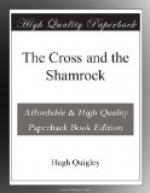WHAT HAPPENED TO LITTLE EUGENE O’CLERY.
Fortune now began to smile on Paul O’Clery, and to make amends for the long course of ill usage to which she had subjected himself and his kindred. He had not only enjoyed the sympathy of friends, and his talents had not only gained him the good will and respect of his superiors and classfellows, but he now unexpectedly found himself in possession of a handsome sum of money, the fruit of the honest industry of his parents. The true Catholic training which Paul received from his very infancy taught him the impropriety of immoderate joy or gladness, and the severe trials of the last few years had chastened his naturally hilarious and pleasant mind to a temper of habitual calm and reserve bordering on melancholy. It must be confessed, in this instance, however, that his spirit felt unusually buoyant and glad, as he returned, under present circumstances, to the scene of his late trials and humiliation.
There are few persons born, however propitious the position of their horoscope, who have not, some time or other, to experience the feeling attendant on a transition from an inferior condition to one of more respect and honor. It will not, therefore, be difficult to imagine what were the sentiments of our young hero on his return from the south, on this occasion. He was a slave; he is now a freeman. He was a menial; he is now a gentleman. He was the subject on which the hypocrite and the impostor sought to try the success of their well-taught deceptions; now, his virtues, his manners, and his success are in the mouths of all men; and those who plotted against his soul are ready to do homage to his accomplishments. When St. Patrick, the apostle of Ireland, returned to the house of his former master, who held him in slavery,—the glorious prelate and saint to the hut of the slave,—what must have been the feelings of his exalted and inspired soul? Not those of hatred, vanity, or earthly exultation, but those of charity, thanksgiving, and apostolic zeal, if not those of gratitude, to his pagan master. Kindred to these was the mental exultation of Paul O’Clery, on approaching the valley of R—— Creek, the scene of the most meritorious part of his life, and still the novitiate of those who were the most dear to him on earth.
He determined not only to redeem his sister and brothers, by paying the customary sum for whatever clothing and board they had received, but resolved, as soon as possible, to have them placed in a suitable educational establishment. Bridget was already free, and by right entitled to something handsome in remuneration of the services she had rendered in the family in which she was so long a menial; but Paul was determined that she should not only refuse accepting what was to fall to her share, and what in justice she could claim, but said every thing should be paid for—board, lodging, and even her “common-school” education. “This last item,” he said,




